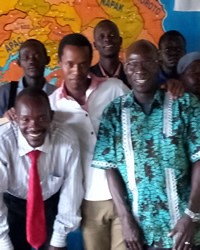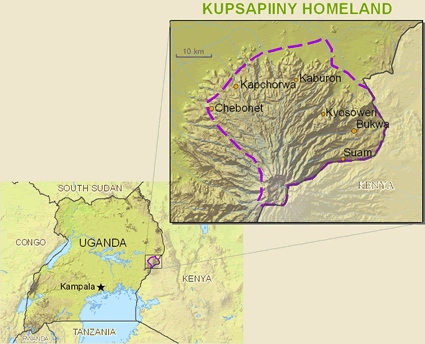Uganda's Sebei people call their language Kupsapiiny, sometimes spelled with an 'a' at the end. They live in eastern Uganda on the slopes of Mount Elgon.
Traditionally, they raise cattle, and many Sebei also rely on subsistence farming, cultivating maize, beans, wheat, and potatoes. They sell their produce when they are able, but poor roads in some areas make it difficult to transport their crops to the market. More than 60 percent of the Sebei people live in poverty.
Clan elders provide leadership and, along with traditional prophets, establish laws, norms, and values. Circumcision, performed on adolescent boys, provides cultural identity. Some Sebei also practice female circumcision, although in secret because it is illegal.
Christianity came to the Sebei in the 1930s through the efforts of a large Christian denomination. Other denominations and Christian groups came in the 1970s. Now 70 percent of the Sebei people identify themselves as Christians, although only about half of those are deeply rooted in their faith and growing. Although they believe in the Creator, many see Him as distant. Many also fear ancestral spirits and practice traditional religion, keeping totems and relying on the revelations of local prophets and clan leaders for guidance.
The existing Kupsapiiny New Testament is not widely used. It is essentially a word-for-word rendering of the English Good News Bible and is not the way the Kupsapiiny naturally speak, so they are beginning a new translation.
Pray for the Holy Spirit to bring revival to Sebei families and churches, spurring them on to love and good works.
Pray for many to become Christ's ambassadors to those without the gospel.
Pray for the Lord to bless them physically and spiritually as a testimony of his power and goodness.
Pray for Sebei husbands to love their wives as Christ loves the Church.
Scripture Prayers for the Sebei in Uganda.
Anonymous
| Profile Source: Joshua Project |











